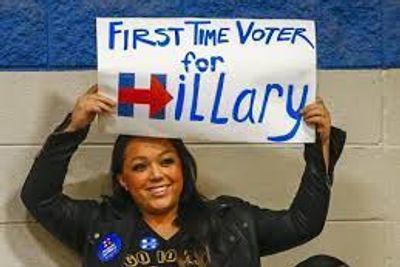Evangeline Morphos set out with some other folks last January to explore this seemingly elusive and chimeric demographic.This will be the first of a series of articles by and about millennials , focusing on the increasing energy and influence that this group of 80 million people aged 18-34. brings to our political process.
Bernie Sanders' early appeal was attributed to the support of the prized Millennial demographic. Let's face it—this is also the target audience that so absorbs the television and advertising industry. In early January , 2016, the folks who started Voices4Hillary began a project to track down this demographic and meet it face to face.
Gerry Laybourne assembled a focus group of young people at Vassar College to have a conversation about the election. Her findings were interesting enough that the group took on the assignment "Take a Millennial to Dinner." (Well, sometimes we took them to lunch, coffee or drinks.) A number of us each met with a diverse group of millennials and asked questions about their political views, the issues that were important to them, and what they felt was at stake in this election.
What we found was that millennials are not a monolithic group; they are a far more diverse group than the media gives them credit for. Many of the young people we spoke with, women, young people of color, and members of the LGBT community, identified primarily with issues relating to those aspects of their identities rather than generational concerns.
There were several observations that we found that impressed us about this group of voters. Millennials are well informed. The young voters we met with rely on primary sources for their news, rather than editorial or interpretive sources. They access major news outlets through phone apps or internet sites . Most read The New York Times, CNN and/or Fox. In some cases, they also followed Politico or The Huffington Post. Many have news alerts for special issues that interest them—climate change, equality, women's rights etc. Essentially, this is a group that curates the news they receive; and their selection process tends to reinforce the ideas they already hold.
Millennials tend not to use social media as a source for political information, nor as a platform for discussion. One woman (a Hillary supporter) said—"I stay away from Facebook and Twitter for politics because I feel people get swept up in a crowd mentality; it is harder to express you views if you feel you will be judged by your friends." Indeed, what is proving to be the case during the course of this election is that Facebook pages are the battleground for an older demographic, and the battleground for surrogates of the candidates.
Millennials access the internet for videos that are mostly comedic or satiric. They see many of these videos as entertainment as well as political. For example, many referenced John Oliver's or Samantha Bee's news shows.
The major factor in the early support of Bernie by millennials seemed to be in the clarity and simplicity of his messaging. This is an issue the Clinton campaign wrestled with from the beginning: oversimplification vs. complexity. Governance requires a consideration of the complexities of an issue; but campaigning requires a clear and repeatable takeaway. Many millennials early in the campaign were not aware of how strong Hillary's positions were on gun control, the environment, health care etc.
What became clear over the course of the primary was that Hillary's message began to reach younger voters. A turning point was the New York primary in which Bernie Sander's ideas were tested in a New York Daily News interview. It turned out that he answered some version of "I don't know the answer to that..." on many questions regarding how he would implement his policies. In contrast, Hillary was beginning to deliver very clear messages on issues ranging from foreign policy, to banking reform and women's issues.
Most importantly, the New York Primary signaled the inevitability of the Trump takeover of the Republican party. Millennials, and indeed the press, began to take seriously the possibility of a Trump presidency. It was the millennials who had followed the comedic representations of Trump who became the most alarmed.
Later, when it became clear that Hillary was on track for the nomination, we went back to many of the millennials we had interviewed. Almost all of them—even initial Sanders supporters—were planning to vote for Hillary. This commitment has become even more intense after the Republican nomination. The real test of the strength of millennials for Hillary came Monday night in Philadelphia. Many millennials including those that had originally supported Bernie were persuaded by the inclusion of their concerns--issues like the environment and equal pay for equal work--in the platform. They also were moved by humor. Both Al Franken and Sara Silverman were enthusiastically supported in making a case for unity in November. Both on the convention floor, and in the cybersphere, millennials are responding to core ideas we had identified in the primaries. They are issues-driven; and their tweets and Facebook posts reflected this.
Many national polls are now showing Hillary to have as much as 85% of the millennial vote. If Hillary can build on the support—and enthusiasm—of this group, which we found to be smart and passionate about issues, she should have a clear victory in November. They get her.
###
July 19, 2016
